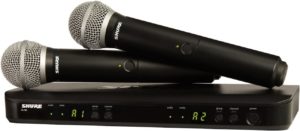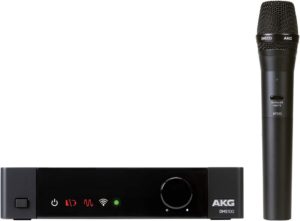The best part of wireless microphones is probably the fact that they give you freedom of movement. They can help to light up and live performances. In most cases, these are dynamic microphones.
So in this article, you will discover the best wireless microphones in 2024. And more examples of the best wireless microphones in the previous years you can find in the following article.
Our Top Picks:
| Item | Main information | Polar Pattern | Number of batteries | |
|---|---|---|---|---|
| The best price-quality match, professional sound, wide range | Unidirectional | 4 AAA | https://amzn.to/3YAelVw |
| Best sound quality, best option for large audiences | Unidirectional | 4 AA | https://amzn.to/3YF2fKV |
AKG Pro Audio DMS100 | Best for the group singers | Unidirectional | 2 AA | https://amzn.to/3YnnT6B |
Shure GLXD24R
So we’re kicking off this list with an ecosystem of microphones by the Shure brand. This is the US brand that starts to get serious when it comes to its wireless products.
The capsule that this mic has is probably one of the most iconic live microphones of all time since the sound quality here is provided by the bundled make capsule. The housing of Shure GLXD is made of high-quality ABS plastic and it’s very long-lasting.
This is a discreet-looking model that has only the button of an on/off switch and also a multicolored battery is LED light breaking up with its functional lines.
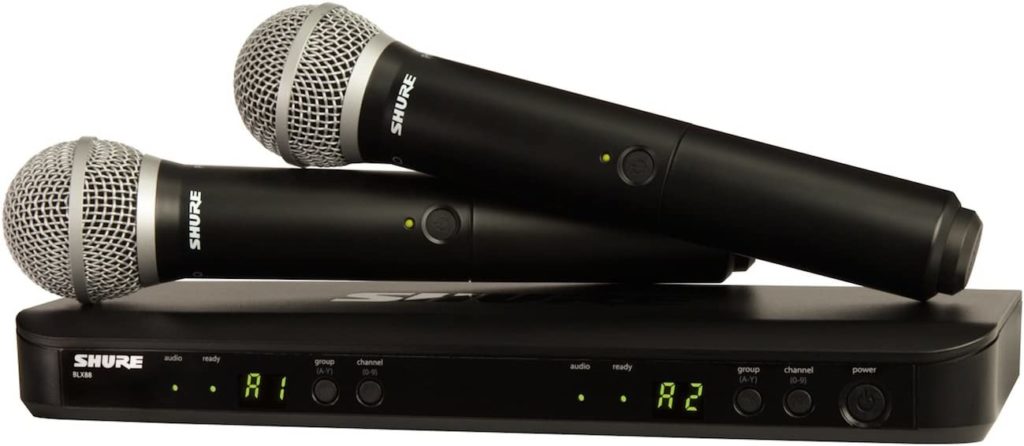
With its impressive range of approximately 30 minutes and battery life of up to 16 hours, Shure is one of the best wireless microphones ever.
Its battery is made of lithium-ion and it can be recharged via the tidy dock that is it has to be at the front panel of the GLXD4R receiver.
The overall looks of this microphone are neat and its LSD screen is easy to read. At the same time, the model is made of cast metal in guarantees you years of reliable service. Especially this microphone is mounted in a rag cabinet.
There you will find a one-touch button for auto setup or you can enter a channel and game settings yourself manually. Because the sure is not just the microphone but the whole echo system you can show six receivers in the rack and manage them centrally.
The central management functionality is an absolute boon for a business stage manager. And it’s also no secret that this ecosystem is meant more for professional usage than for the dummies.
But the overall quality of the performance that it will help you to achieve is incomparable and this microphone is very reliable and it costs not that much in comparison to its competitors.
Pros:
- Legendary sound
- Digital transmission
- Multiple units can be managed centrally
- Rack-mountable
Cons:
- 2.4GHz signal is not for everyone
You may also like: 11 Best Wireless Microphones for Events
Sennheiser Professional E 935 Dynamic Cardioid Vocal Microphone
Sennheiser brand is also one of the most respected and trusted names in the music gear industry, particularly, in wireless mics.
You’ll find its products everywhere where the situation requires having professional audio systems starting from theaters and ending with the recording studios.
So this particular microphone model is an excellent place to start in case you’re looking for a pro-level microphone gear.
And though this item is a little bit pricey, okay not just a little bit, this advancement will pay itself back with the durability, quality, and professional sound level.

It also comes with a huge portfolio of mouth-watering accessories that will cover everything from headsets next to wireless guitars and base packs. The main kit comprises an SKM 500 D4 handle transmitter armed with a dynamic MMD cardioid capsule.
The capsule can be interchanged between any of the other Sennheiser microphones, doesn’t matter if that’s a condenser or super-cardioid microphone.
And because this Sennheiser company also owes the Neumann company you can even slap one of its condensers on that if you want to get that legendary Neumann sound.
In the kit, you will also find the rack mountable receiver which is basically a masterpiece, especially its large clear OLED display.
It’s extremely powerful and it can output our signals at up to 50 MW in case the laws allow it. If you’re a professional sound editor, you will find a lot of space here to play with the frequencies of this microphone.
The model constantly looks for independent receivers and it chooses the one with the strongest signal.
All in all, this microphone will give you one of the strongest performances and it’s the perfect wireless microphone both for vocals and instrumental music.
It will help you to deliver the finally collaborated, natural sound that will be rich in detail. And the best part is that the microphone comes with a 10-year warranty.
Pros:
- Top-notch build
- Up to 88MHz bandwidth, with 3,520 selectable frequencies
- High RF output power
- Swappable high-end capsules, including one from Neumann
Cons:
- UHF frequencies limit to use in other countries
AKG Pro Audio DMS100 Digital Wireless Microphone System
This is a microphone system that can be best described as an unplug-and-play. Initially, it was created for artists who want to focus on the creative aspect of their work rather than on technical aspects.
It’s a really price-wise microphone system that is also idiot-proof. The 2.4 GHz operation is versatile and will be able to work in most environments and it’s also suitable for traveling.
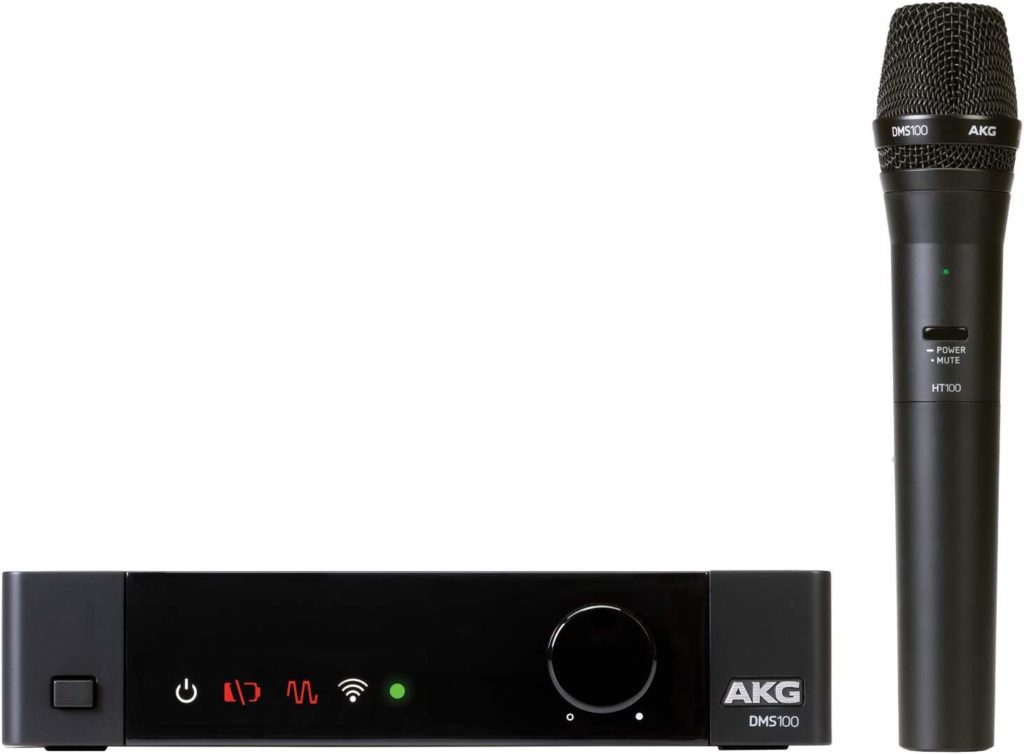
In order to channel pair this microphone you just need to press a button on it and then you’re done. For those who like to dig deeper into the technical details, there are no unpleasant surprises lure that can catch you.
The audio quality is decent and the transmission is digital and there’s even AES 256-bit encryption. These aspects are not that important for vocalists but if you’re looking forward to speaking for big audiences then that’s a useful feature.
Currently, there are two versions of this microphone system are available on the market.
The first one includes a cardioid-handled mic and the latter includes a microphone with a bodypack transmitter that can be combined with the headset or clip-on mic.
Pros:
- Affordable
- Easy to use
- Digital
- AES encryption
Cons:
- 2.4GHz is not for everyone
You may also like: best microphones for public speaking big audience
Electro-Voice ND76 Dynamic Cardioid Vocal Microphone
If you’re a professional sound editor, musician, vocalist, and so on, you should look no further than for the Electro-Voice brand. It provides high-end models of microphones which are never for beginners.

The company’s E3 range sticks with the UHF or 2.4 GHz because the brand believes it provides better security and scalability.
Each receiver here therefore can boast up to eight groups of channels and those channels include up to 22 channels per group. Therefore this microphone system is suitable for conducting large concerts or festivals.
This kit is bundled with a large diaphragm AD96 super-cardioid capsule that is perfect for the loud stages because it can handle the exceptionally high gain.
At the same time, keep in mind that this model only has other Electro-Voice capsules to choose from including condensers with Charity White or super-cardioid patterns. Another interesting aspect of this microphone is that it’s surprisingly easy to use (for pros).
For example, the receiver here can order detect and select open frequencies which can be connected to the transmitter.
There’s also a huge LSD display for convenience that shows group and channel information and also the remaining battery charge.
But before buying this microphone, keep in mind that you might need a license to operate it.
Pros:
- Multiple capsule choices
- Diversity receiver
- Performs well on loud stages
- Tough, metal construction
- UHF
Cons:
- None
Shure SM58 Cardioid Dynamic Vocal Microphone
This is a more popular and more common wireless microphone by Shure. It’s very affordable and it’s easy to use and that’s why all kinds of musicians choose it.
Despite all the differences between the professional microphone kits and this model, Shure provides a decent quality of sound and you can often see that female singers use it in their concerts.
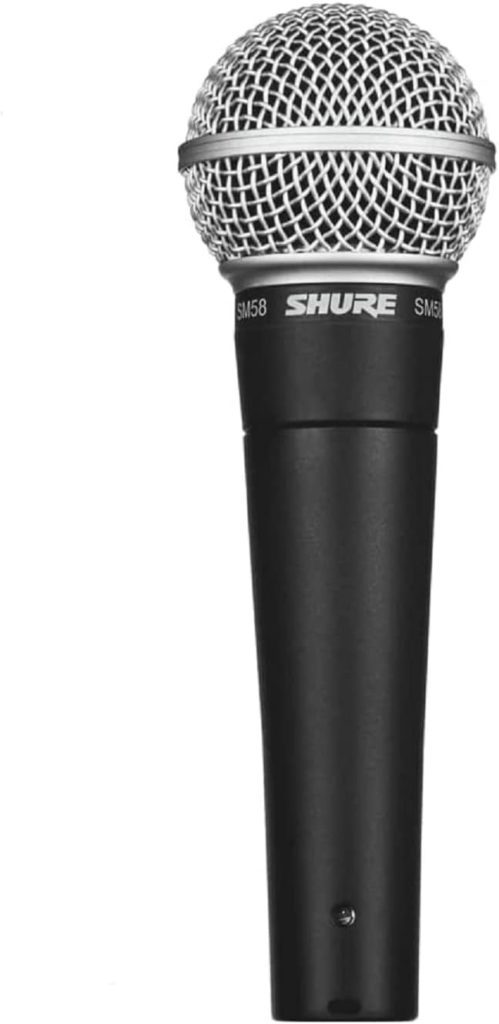
Probably, when it comes to life vocals, Shure SM58 is the best choice. It has a decent frequency range and with its price range, it’s a great item for live vocals. With SM58 the sounds are produced as they were intended.
Another advantage of Shure is that it can suppress the background noises capturing only the voice of the singer, therefore this microphone will be suitable for everything starting from the club show and ending with the stadium.
The sound that it delivers is rather warm, crisp, and clear. The model is also good at handling the noise which gets absorbed by the pneumatic shock mount.
There’s also the spherical mesh grill that can swallow all-day closets and wind sounds and it also happens thanks to the pop-up filter that is built in.
Its extended frequency response, unusual for a microphone of this level, is specifically shaped for vocals because it has the bright and mid-range and the bass roll-off to control the proximity effect.
The only thing is that the distance of the signal of this item is not as strong as in the previous models, but that can be compensated by the price.
Pros:
- Inexpensive
- Rugged
- Perfect for small bands/ensembles
Cons:
- Proximity is limited
Tonor Wireless Microphone
And since we started speaking about the budget but high-quality microphones, let’s also review this item by Tonor. It comes with a built-in digital decoding technology that is used for generating high-quality sound.
What is more, its wireless range can be up to 60 m and it’s more than enough for any type of performance. Surprisingly, for its price, Tonor wireless microphone has quite a sturdy build and excellent design.
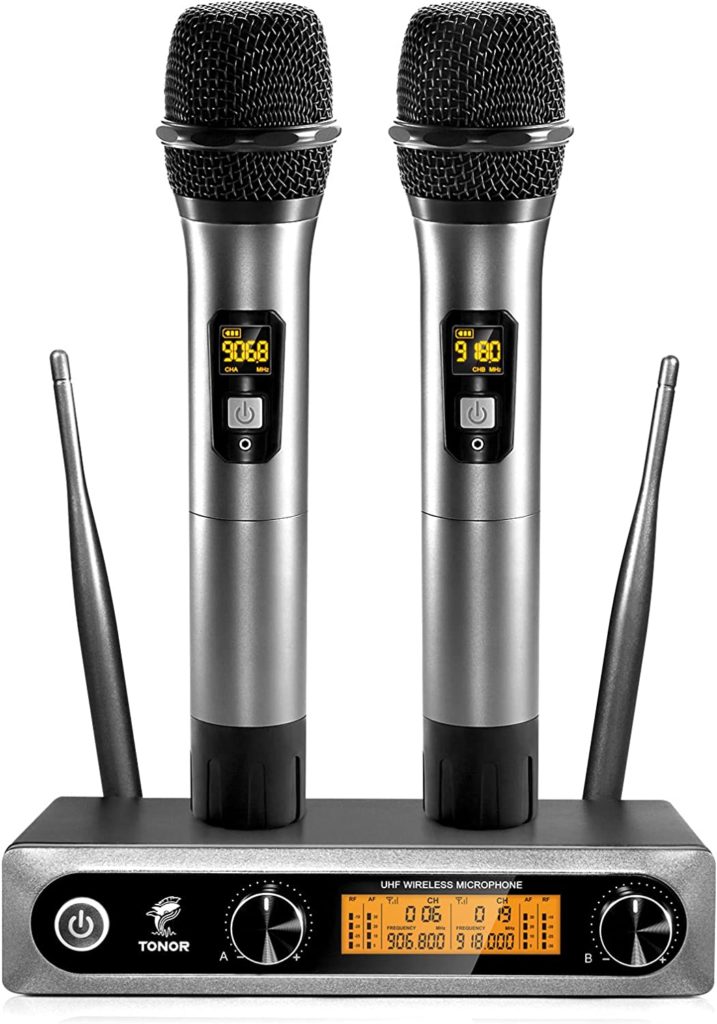
The microphone has a matte black finish that looks good on the stage. In addition to all of that mentioned above, the toner wireless microphone also has a simple setup. You will only need the connector and the accessories that come in the kit.
The microphone runs on 4 AA batteries for up to 10 hours. In general, this microphone could be ideal for small and medium-sized audiences and even open-air events. The mic would be suitable for public speaking in a big audience as well.
And one of the best advantages of the Tonor microphone is that it can automatically and instantly detect the frequency and with the steady range, signal loss is the least of concerns. And the sound quality that is provided by this microphone is just a blast.
Considering the fact that it’s plug and plays microphone it’s amazing. The only downside of it is the battery life because often users discovered them the charge last way less than 10 hours.
Pros:
- Affordable price
- High quality the materials
- Fast and easy to set up
Cons:
- Battery life is shorter than expected
You may also like: best voice over microphones
Sennheiser Pro Audio XSW 1-825
Here we have another representative of the Sennheiser family and it’s probably the best item on our list when it comes to portability.
It’s one of the top of the range quality wireless microphones and this time it has a surprisingly low price if you compare it to the other items of this brand.
This microphone comes in a kit with a signal receiver, 8 per 10 channel compartments, and colorful icon indicators. Here you will also find the hands-free feature which is convenient and cool to use when you need to multitask.
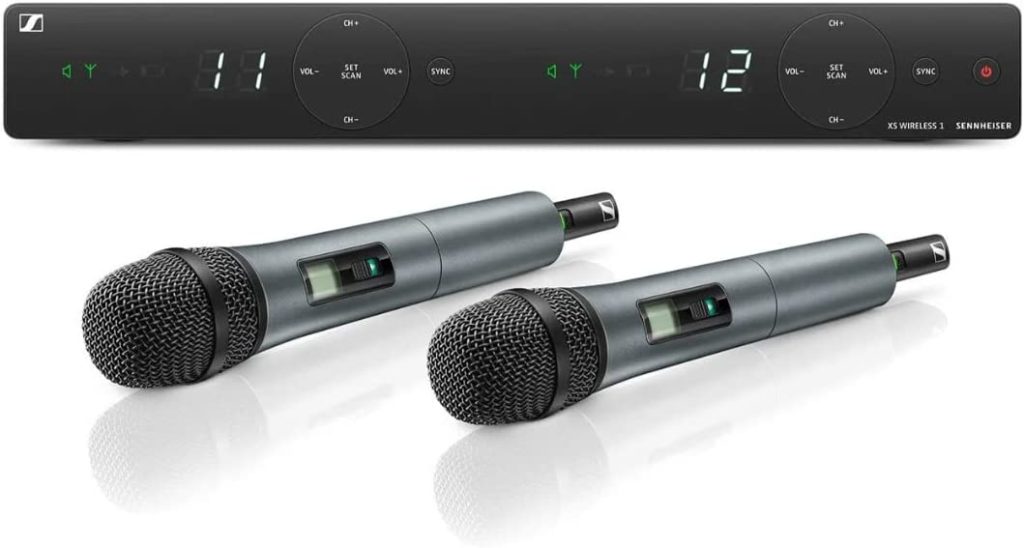
This wireless microphone is extremely versatile and can be used anywhere but it’s especially good for the live coverage of offstage performances. Its battery life lasts up to 10 hours and then you will need to recharge the microphone again.
Sennheiser is a great companion for camping troops or even open-air events the way you have no power outlets. This particular model will be a great fit for all types of performance.
And this microphone system is surprisingly easy to use when it comes to live performances because the kit features this Sennheiser prolific microphone pots. These are the cardioids and dynamic e825 to be exact.
What is more, this microphone comes with an interactive receiver so you could make a swift set up whatever you need it. It’s really easy to set the microphone, but at the same time, this model is not completely for dummies.
And should we even mention that the quality that it provides is simply great? The only downside of this model is that the range of this microphone is not as far as we hoped for.
Pros:
- Top sound quality
- Hands-free configuring
- Low price
- Long battery life
Cons:
- The signal range could be wider
FAQ for Wireless Microphones Buyers:
Are wireless microphones as good as wired?
Shortly – Yes.
Let’s look at the pros and cons of using both types of mics.
Wireless microphones offer several advantages over wired options, including being more portable, versatile, and easier to take on the go. They don’t require any cables or manual set up, making them ideal for quick setup in remote locations or on stage. Plus, because there’s no cabling involved, they can be used to capture sound from farther away than wired mics could—up to hundreds of feet away in some cases.
Still, it’s important to consider that wireless microphones have a limited range compared to their wired counterparts. This means you may need additional equipment such as amplifiers in order to reach long distances outdoors or large venues. Furthermore, wireless systems can produce signal interference if multiple units are running within the same area or frequency bandwidth. This can lead to unreliable audio capture that’s not consistent with what’s happening on stage (or off).
In short, while wireless mics come with their own set of advantages and drawbacks, they are not an all-in-one solution for everyone’s needs. Whether wireless is better than wired will depend largely on your purposes and preferences.
Since you are on this page we consider you check for our wireless mic suggestions above as well as amplifiers.
Why don’t singers use wireless mics?
They actually use it pretty often.
While many singers and performers use wireless mics for their convenience, there are several reasons why they might not be the best option.
First, as mentioned previously, wireless microphones have a limited range compared to wired ones. Additionally, they may produce signal interference if multiple units are running within the same area or frequency bandwidth. This can lead to unreliable audio capture that’s not consistent with what’s happening on stage (or off).
Finally, despite being more portable than wired mics, wireless microphones require battery power, so singers must have extra batteries on hand in case their current one runs out of juice mid-performance. In addition, some venues and facilities may not allow the use of wireless technology due to safety regulations or other concerns. For these reasons and more, singers may opt to stick with wired microphones instead.
How long does wireless microphone last?
The battery life of a wireless microphone will depend on the type of technology used and the type of batteries used. Generally speaking, most modern wireless mics can last anywhere from 5 to 14 hours with standard battery types like AA and AAA.
Additionally, some wireless mics use rechargeable batteries which can be recharged in a few hours or overnight for extended use. Some advanced systems even come with built-in features that allow you to monitor the battery’s status and adjust settings accordingly to optimize its performance.
What are the types of wireless microphones?
Wireless microphones come in a variety of types and styles, but the most common are handheld mics, lavalier mics (also known as lapel or collar mics), headset mics, instrument-mounted mics, bodypack transmitters, and dual-channel systems.
Handheld mics are typically used for lead vocalists in live performance situations. Lavalier mics are ideal for presentations or theater performances because they free up the presenter’s hands while still capturing audio.
Headset mics are great for singers who prefer to have their hands free while performing. Instrument-mounted mics can be attached to drums, guitars, and other instruments to amplify sound without interference.
Bodypack transmitters are small and lightweight, making them optimal for performers who need more mobility on stage.
And lastly, dual-channel systems allow two transmitters to send audio signals to one receiver simultaneously that is ideal for studio recordings or larger events.
